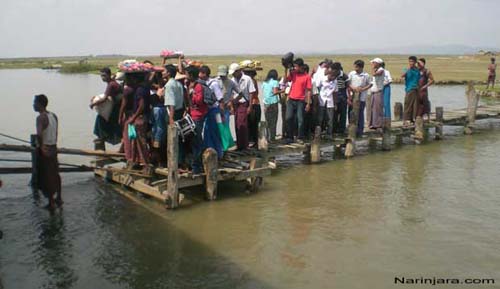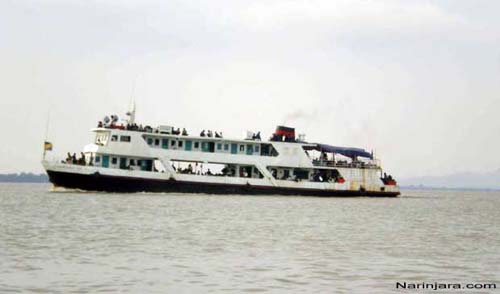Sittwe: Local people in coastal Arakan State in western Burma have been suffering from the enormous rise in fares and decline in service for riverine travels after the Inland Water Transport Department recently privatized the most significant and essential shipping lines in the state.
A commuter from the capital Sittwe said the private companies have raised ship fares by two to six times as much as the fares that were being charged during implementation of the IWT.

"Now we have to pay 1,500 Kyat for a ticket from Sittwe to Mrauk U, 3,000 Kyat to Buthidaung, 8,000 Kyat to Taunggok, and and extra 50 Kyat for filling out the form to buy tickets for a particular journey. Before privatization, we had to pay only 300 Kyat for Mrauk U, 500 Kyat for Buthidaung, and 3,000 Kyat for Taunggok," the commuter said.
However, he added that those fares are just for sitting on the bare floors of the vessels, and passengers have to pay an additional 1,000 to 3,000 Kyat for a chair, and 3,000 to 6,000 Kyat for a special room on the vessels.
Narinjara has contacted the regional head office of the department in Sittwe for more information about the hiring of the ships to private companies, but the department declined to give any comments on the move.
According to local residents, the riverine itineraries from the capital Sittwe to Buthidaung, a distance of 80 miles, and to Taunggok, a distance of 224 miles, are essential because there are no road links between the capital and those and a number of intermediate towns. Only Mrauk U, 40 miles away, can be reached by road from Sittwe.
The department of Inland Water Transport has hired out nine passenger-cum-cargo ships to the private companies under a six-month agreement that started 12 July, 2011. The three ships sailing between Sittwe and Taunggok have been hired out to the U Kyauk Taung Company, while the three ships sailing between Sittwe and Buthidaung have been hired to the Thiha Raza Company, and the remaining ships sailing between Sittwe and Mrauk U have been hired to the U Thein Soe Company.
The owners of the companies that have taken leases on the public vessels are local businessmen who are also senior members of the regional Union Solidarity and Development Party, the military proxy party that is leading the current government in Burma.
A sailor from Dyanyawaddy-1, one of the three vessels plying between Sittwe and Buthidaung, said apart from the fare hikes, the services for passengers have declined in quality, as the companies are using the vessels in large part for the transport of their own cargo.

"Not only have fares risen, services for passengers on the ships are also becoming poorer than before, because the companies are especially hiring the ships for transporting their own cargo for their own profit, and they are not thinking about the well-being of the passengers traveling on the ships," said the sailor.
He added that the companies are able to increase their profits because they are being sold the oil to operate the ships at the government rate, which is far below the market rate in Burma.
According to the sources, the authorities of the Inland Water Transport have gradually stopped a number of ships sailing across Arakan State, leaving just these nine ships, after the Sittwe-Rangoon Highway and a number of connecting roads opened in the state in 2000.
However, the public still depends mainly on the river routes for their travels inside the state, as the roads have been in ruins with many potholes and collapsed sections since shortly after they were opened, and every year during the rainy season sections are washed away and become totally impassable with their weak structure and lack of repairs.
Road infrastructure in the state is unreliable for travel, with almost every road, including the Sittwe-Rangoon Highway, still closed after being damaged and left in ruins by the disastrous floods that swept across the state during the last week.
Sources said that river travel and transportation is still very important for the people of Arakan, a state abundant in creeks and rivers. There are also a number of private companies that operate express boats for passengers on most river routes in the state, but most of the general public are unable to afford those fares for their own travels.
"The current public ship lines being privatized by the authorities are essential and significant for the public commuters in our state, and this just clearly shows how the authorities have neglected the publics' difficulties and woes for their travel and transportation within their own state," said the commuter from Sittwe.


